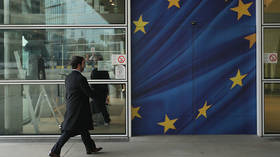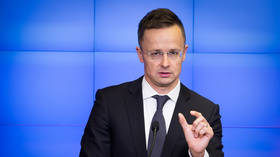EU approves new anti-Russia sanctions

EU member states approved a tenth round of anti-Russia sanctions on Friday, following other Western states in imposing new measures to mark the one-year anniversary of Moscow’s military operation in Ukraine.
The latest sanctions include tighter export restrictions on dual-use items and technology, as well as “measures against Russian disinformation,” according to an announcement by the Swedish Presidency of the Council of the EU. The bloc also agreed to impose fresh restrictions against individuals and entities that are deemed to be supporting the military operation, “spreading propaganda or delivering drones used by Russia” in Ukraine.
“The EU stands united with Ukraine and the Ukrainian people. We will keep supporting Ukraine, for as long as it takes,” the Swedish Presidency said.
The statement echoed a phrase, “as long as it takes,” used by President Joe Biden and other US officials in recent days to reiterate Washington’s support for Ukraine. And like those US leaders, the EU didn’t specifically define the goal that must be reached, as long as it takes.
The US, the UK, Australia and New Zealand announced their new anti-Russia sanctions earlier on Friday. EU members reportedly struggled for a third straight day to reach agreement on their new measures, at least partly because of an impasse between Poland and Italy over new restrictions on rubber imports.
Despite Western leaders’ insistence that these sanctions “are working,” Russia’s economy contracted by only 2.1% last year, far less severely than the 11.2% predicted by the World Bank in April. With energy revenue higher than before the conflict began, the country’s economy is predicted to grow faster than the UK’s this year.
The sanctions, which were meant to impose suffering on the Russian people, have backfired on Western nations, President Vladimir Putin said on Tuesday. “They miscalculated, and Russia’s economy proved much more robust than the West expected,” he said in his annual address to the country’s lawmakers.













